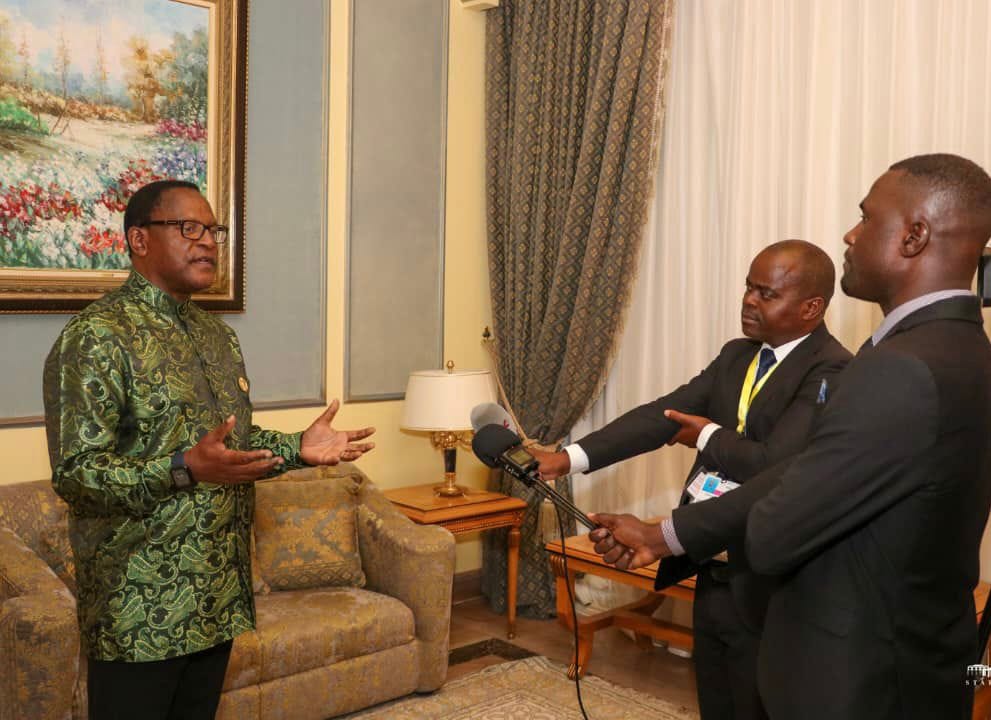Leaders discuss fertilizer challenges
Fertilizer prices in Malawi have risen from K27, 000 in the previous growing season to around K75,000 this season.
Sharm El-Sheikh, Egypt: World leaders attending COP27 have taken on the responsibility of resolving the issue of skyrocketing fertiliser prices and scarcity of the commodity, as the United Nations agency, International Fund for Agriculture Development, predicts that fertiliser shortages will have severe consequences for smallholder farmers.
Fertilizer prices in Malawi have risen from K27, 000 in the previous growing season to around K75,000 this season.
President Lazarus Chakwera said in an interview at the Concorde Hotel in Egypt on Wednesday that he and colleagues as Presidents and other stakeholders took time to discuss the issue of fertiliser, which he said is a concern for many nations.
Tanzanian President Samia Suluhu Hassan, Kenyan President William Ruto, president of Botswana Mokgweetsi Eric Keabetswe Masisi, and Ethiopian Prime Minister are some of the leaders with whom Chakwera met on Thursday.
Chakwera said: “We have been talking on how best we can facilitate the bringing in of fertilisers, for example, so that we (Malawi) do have this programme (AIP), no matter what and it is going to happen.
“What needs to happen in the long run is actually for us to be able to have fertilisers that are okay for the soils of Malawi and that means having some of these industries right there in the country.”
Smallholder farmers like Inessi Maliko are concerned that they will not be able to access fertiliser due to the commodity's scarcity and high prices.
Chakwera urged Maliko and other smallholder farmers not to panic, stating that his government is working on mobilising fertiliser both locally and internationally.
He said: “Farmers like Inessi and the others need to know that their concern is genuine fertilizer prices have gone way up high because of the supply chain.
“People might feel like for now because there have been these issues then it’s hopeless. No, it’s not because we have put in place measures that will respond to these concerns.”
Alvaro Lario, president of the International Fund for Agricultural Development (IFAD), smallholder farmers cannot absorb high fertiliser prices.
“If current prices of energy continue where they are, the supply of all the stock will be depleted and the supply of fertilizer will be extremely challenging. That’s gonna have a massive impact,” Lario said.
IFAD loans in Malawi are aimed at promoting sustainable agricultural practices and integrating the private sector and smallholder farmers in value creation.
While Lario is optimistic about IFAD's programming's ability to assist smallholder farmers, he is quick to point out that the farmers will face numerous short-term challenges.
ANAPRI members in Malawi include Mwapata and LUANAR.
Eisenhower Mkaka, Minister of Environment and Natural Resources agreed that the fight against climate change must be science-based and that a scientific body would be ideal to lead the fight.
On the sustainability of the capacity building initiative, Mkaka stated that the government is ensuring that there are watertight policies in place that will serve as a guide even when governments change.
The Least Developed Countries (LDCs) Universities Consortium on Climate Change (LUCCC) is a long-term South-South capacity-building platform comprised of universities from the LDCs as founding members. It is promoting a collaborative network for increasing climate change research capacity and expertise.
Aside from the AIP, Chakwera stated that the government is prepared to assist more Malawians through the Mtukula Pakhomo Programme, as this time around 8 million people are on target, a 100% increase from previous recipients.
Adaptation is high on the COP27 agenda so that societies are better prepared for the effects of climate change in terms of soil management, including the adoption of drought-resistant crops.
.





